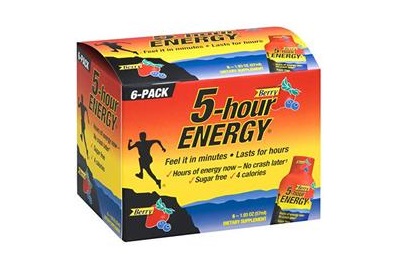
A husband and wife have been found guilty of producing millions of bottles of fake energy drinks in the first-of-its-kind US criminal prosecution on counterfeit food and beverages.
Joseph and Adriana Shayota, the ringleaders of an 11-person operation, were found guilty for their part in an elaborate racket that involved the bottling of the fake energy drink 5-Hour Energy in an unsanitary and unlicensed factory in San Diego.
The guilty verdict referred to two conspiracy charges related to counterfeiting, copyright infringement and misbranding food. A federal jury deliberated for nine and a half hours before reaching the verdict.
Other members of the group recently pleaded to felonies, although one remains a fugitive in Mexico. Sentences for all involved are yet to be handed down but will likely include lengthy prison time and hefty fines.
The operation where almost five million bottles of the energy drink were counterfeited was discovered and shut down in 2012. The bogus drinks, which were referred to by the counterfeiters under the code word "michelada" (a Mexican beer cocktail), had been distributed to wholesalers across the US and Canada and more than a million of the fakes were consumed by the public.
The Shayotas originally had a licence in 2009 to distribute 5-Hour Energy in Mexico through their firm Baja Exporting but breached that agreement by trying to divert cheaper, Spanish-labelled product back into the US market with American price tags. After that effort failed they swapped the Spanish labels for fake English labels and packaging to divert genuine bottles and then later turned to making and distributing counterfeits of the brand. According to reports, the operation was producing 75,000 fake bottles a day.
The criminal prosecution follows a 2012 investigation by the maker of 5-Hour Energy, Living Essentials LLC, after a sales representative discovered counterfeit bottles of the energy drink for sale in retail stores. The firm’s legal team, under a unique area in the law, was able to obtain court orders that allowed Living Essentials to seize the fakes and other incriminating evidence and shut down the facility.
A criminal investigation was later opened and, in May last year, the group was charged with conspiracy to traffic counterfeit goods, conspiracy to commit criminal copyright infringement, and conspiracy to introduce misbranded food into interstate commerce. The energy drink maker was also awarded $20 million in damages for trademark and copyright infringement in a civil lawsuit against the distributors and manufacturers of the fake drink.
This however is the first time there has been a criminal prosecution relating to food counterfeiting. This is because it has been difficult to prove that the sellers knew the goods to be fakes.
Geoffrey Potter, chair of the anti-counterfeiting practice at Patterson Belknap Webb & Tyler LLP, lead counsel to 5-Hour Energy and who brought the case against the ringleaders, said criminal convictions profoundly change counterfeiters’ risk versus reward calculations. "Counterfeiters are merely corrupt businessmen and women and civil judgements to them are nothing more than a business expense or nuisance. However, spending years in prison is a real deterrent."
©
SecuringIndustry.com





